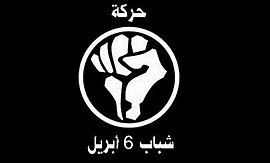April 6 Youth Movement
| حركة شباب 6 أبريل | |
 |
|
| Founded | 2008 |
|---|---|
| Founders |
Ahmed Maher Asmaa Mahfouz Mohammed Adel |
| Type |
Pressure group Political group |
| Focus |
Democracy Social justice Free and fair elections Civil resistance Secularism |
|
Area served
|
Egypt |
|
Key people
|
Ahmed Maher Mohammed Adel Amr Ali |
| Website | 6april.org |
The April 6 Youth Movement (Arabic: حركة شباب 6 أبريل) is an Egyptian activist group established in Spring 2008 to support the workers in El-Mahalla El-Kubra, an industrial town, who were planning to strike on April 6.
Activists called on participants to wear black and stay home on the day of the strike. Bloggers and citizen journalists used Facebook, Twitter, Flickr, blogs and other new media tools to report on the strike, alert their networks about police activity, organize legal protection and draw attention to their efforts.
The New York Times has identified the movement as the political Facebook group in Egypt with the most dynamic debates. As of January 2009[update], it had 70,000 predominantly young and educated members, most of whom had not been politically active before; their core concerns include free speech, nepotism in government and the country's stagnant economy. Their discussion forum on Facebook features intense and heated discussions, and is constantly updated with new postings.
The April 6 movement is using the same raised fist symbol as the Otpor! movement from Serbia, that helped bring down the regime of Slobodan Milošević and whose nonviolent tactics were later used in Ukraine and Georgia. Mohammed Adel, a leader in the April 6 movement, studied at the Centre for Applied Nonviolent Action and Strategies, an organization founded by former Otpor! members. The movement was banned by an Egyptian court on 28 April 2014. The Constitution Party condemned the verdict, arguing that the charges against the movement were "false" and that the court ruling was an example of state institutions undermining and destroying the rule of law. Hamdeen Sabahi's presidential campaign warned of the "return to a state of suppression and banning." Abdul Ghaffar Shukr, vice president of the National Council for Human Rights, has stated that the council is prepared to stand in solidarity with the April 6 Youth Movement, and will aid the movement if it requests assistance.Human Rights Watch condemned the ruling as "a clear violation of citizens’ rights to free association, peaceful assembly, and free expression." The April 6 movement has vowed to defy the ban, as well as attempt to repeal it.
...
Wikipedia
